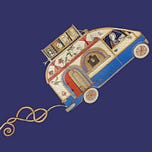The Gotha Conference
After the books and boxes had been delivered by a trusted crew of art handlers to “my secure warehouse, the location of which I will not disclose,” Roger McAllister conducted his “thorough and scholarly assessment” of the remaining inventory of the Konrad Josef Bücherregal, the old socialist bookstore in Munich. Four years later, on his book tour, McAllister would tell his audiences how he had found the old books “fascinating, absolutely fascinating,” but that his practiced and professional eye had determined that they possessed more historical interest than market value. So he had arranged a donation to the German Studies Department of a Lutheran college in Nebraska, which had proven to be a wise tax strategy for those members of the Josephson family who had settled in the United States—here McAllister would offer his apologies for “mentioning the U.S. Tax Code in polite company,” and pause for polite Canadian laughter.
In fact, McAllister found the great bulk of the material to be extraordinarily tedious: Josef Konrad Josefsohn had been the most tiresome kind of self-lacerating social democrat, and McAllister was all too aware that the market value of 19th-century leftist tracts was rapidly approaching zero. The Lutheran librarian in Nebraska, who had vague memories of a socialist grandfather, was the only person on three continents (Europe, South America, and North America—McAllister had done his due diligence) willing to take the damned books. And as for the old man’s correspondence, the ephemera from the supposed “chest of Nazi papers,” McAllister began to sort it immediately into three piles: the family material, which McAllister knew would be the source of many billable hours; the unbearable socialist twaddle, which he looked forward to committing to the flames; and a third pile, for those items which attracted his genuine interest. McAllister quickly realized that the third pile consisted almost exclusively of the correspondence between Josef Konrad Josefsohn (or Konrad Josef, as he signed himself) and a man named Adalbert Kehr.
The friendship between the two had begun, as far as Roger McAllister could tell, in Gotha, at the socialist conference of 1875. McAllister knew, although he would have preferred to forget, that this was the meeting where the ADAV of Ferdinand Lassalle merged with the SDAP of Bebel and Liebknecht to become the SAPD, Sozialistische Arbeiterpartei Deutschlands, the Socialist Workers’ Party of Germany, the soon-to-be outlawed ancestor of today’s German Socialists. Josefsohn, who was already beginning to introduce himself as Konrad Josef, had recently taken charge of his father’s used bookstore in Munich (he had already moved the Judaica to a back room); Kehr had just finished his studies in philology at the University of Marburg, and had won a post in the Prussian civil service. Although the Gotha Conference itself bored Roger McAllister silly, he found the friendship between Adalbert Kehr and Josef Konrad Josefsohn easy to understand—at least the beginning of that friendship—they were both young men full of fiery dreams, and equally in love with dusty books.
The two young men had little to do with the actual business of the conference. Kehr had simply traveled on his own expense to Gotha, hoping to “learn and observe,” and Konrad Joseph’s role was only slightly more official—he was the self-appointed representative of the tiny SDAP cell in Munich. Thrilled simply to be there, among the vanguard, they watched the conference from the margins, where their friendship blossomed. They listened respectfully to the grizzled veterans of 1848, they argued about Stirner and Feuerbach, and they recapitulated, over many beers, the debates between the Eisenachers and the Lassaleans. Late at night, their conversations grew more personal and passionate: Konrad Josef confessed to the agony of being in love with a deeply religious young woman, while proclaiming his unwavering determination (despite the compromises with theism that marriage might require) to make his little bookshop the center of “advanced thought” in Munich; Adalbert Kehr spoke of his posting to Silesia, a lonely clerkship in a converted abbey which offered a single consolation: access to an ancient library.
One evening, as the conference was drawing to a close, they staged an impromptu skit they called “The Love Life and Death of Ferdinand Lassalle.” Kehr, putting on a monocle and a debonair attitude, played Lassalle, while Konrad Joseph, wrapping himself in a series of scarves, played several countesses and daughters of conservative diplomats, as well as their jealous husbands and bourgeois fathers. The skit, performed in a beer-hall basement, was well-received by its audience, primarily a contingent of Marxist miners from Cologne. Their fiction ended, unlike history, with Lassalle winning all his duels and deposing the aristocracy—only to die by the knife of a jealous mistress, in bed. After the skit, Kehr heard one of the miners remark to another that there was nothing he liked better than watching little Jews take the piss out of big Jews.
Kehr had no idea what the fellow was talking about. Konrad Josef, his new friend, understood all too well, but did not explain.
The next morning they both left Gotha, laughing about their hangovers, and promising to write.
Next episode: Exit 51
For the impatient:
Buy ebook, audiobook on Amazon
Buy paperback on Lulu
Or just wait for the next episode…












Share this post